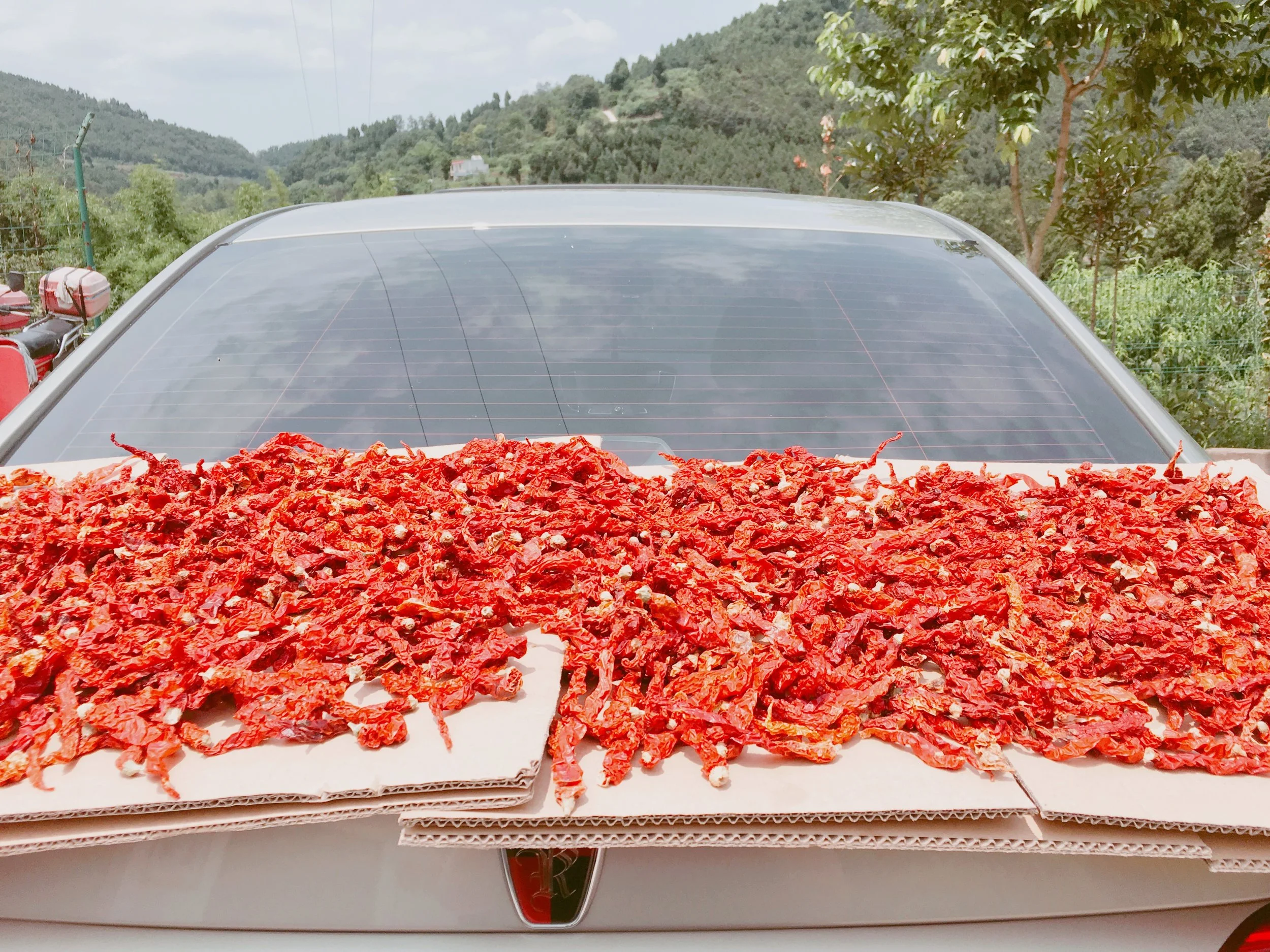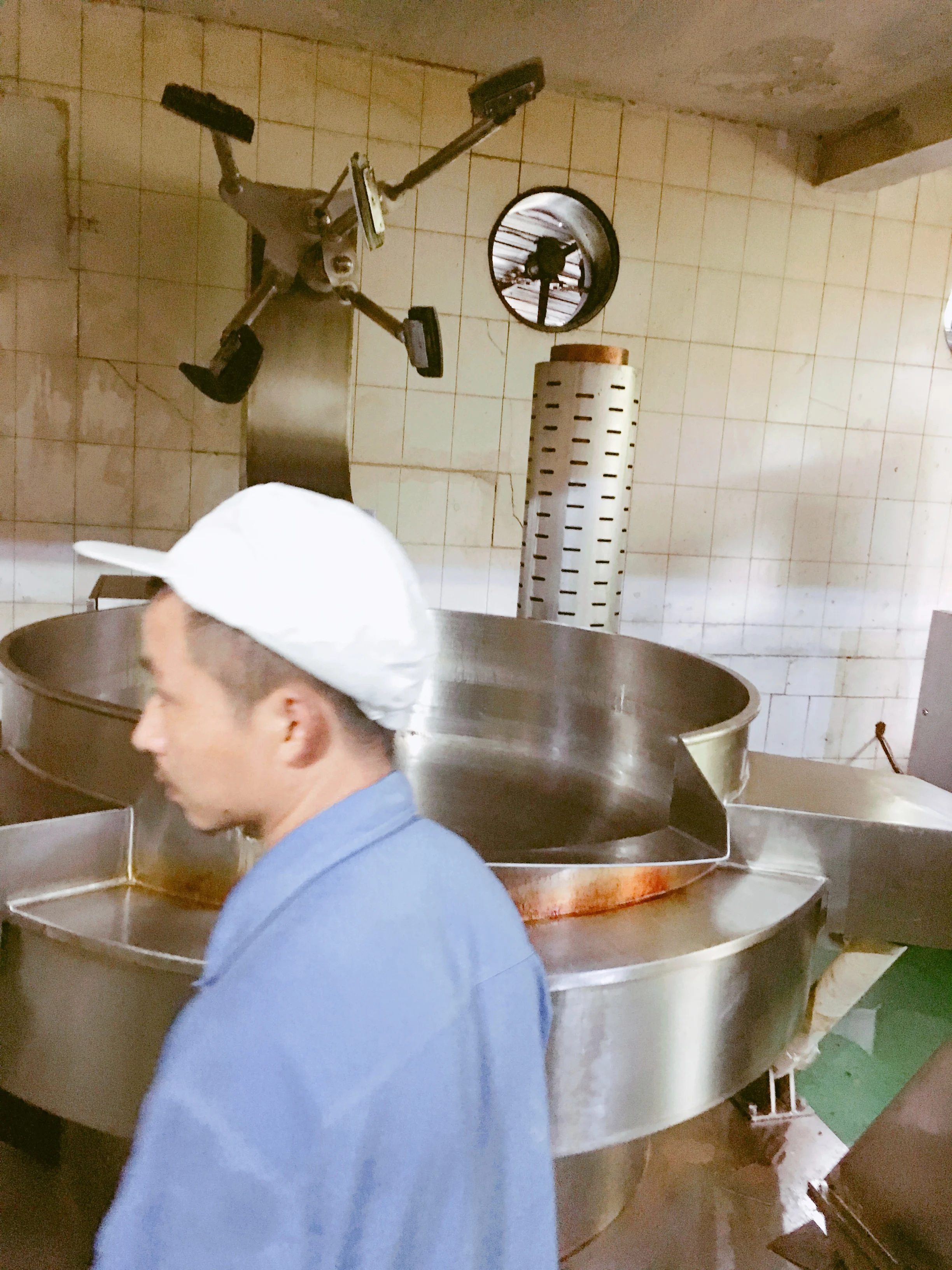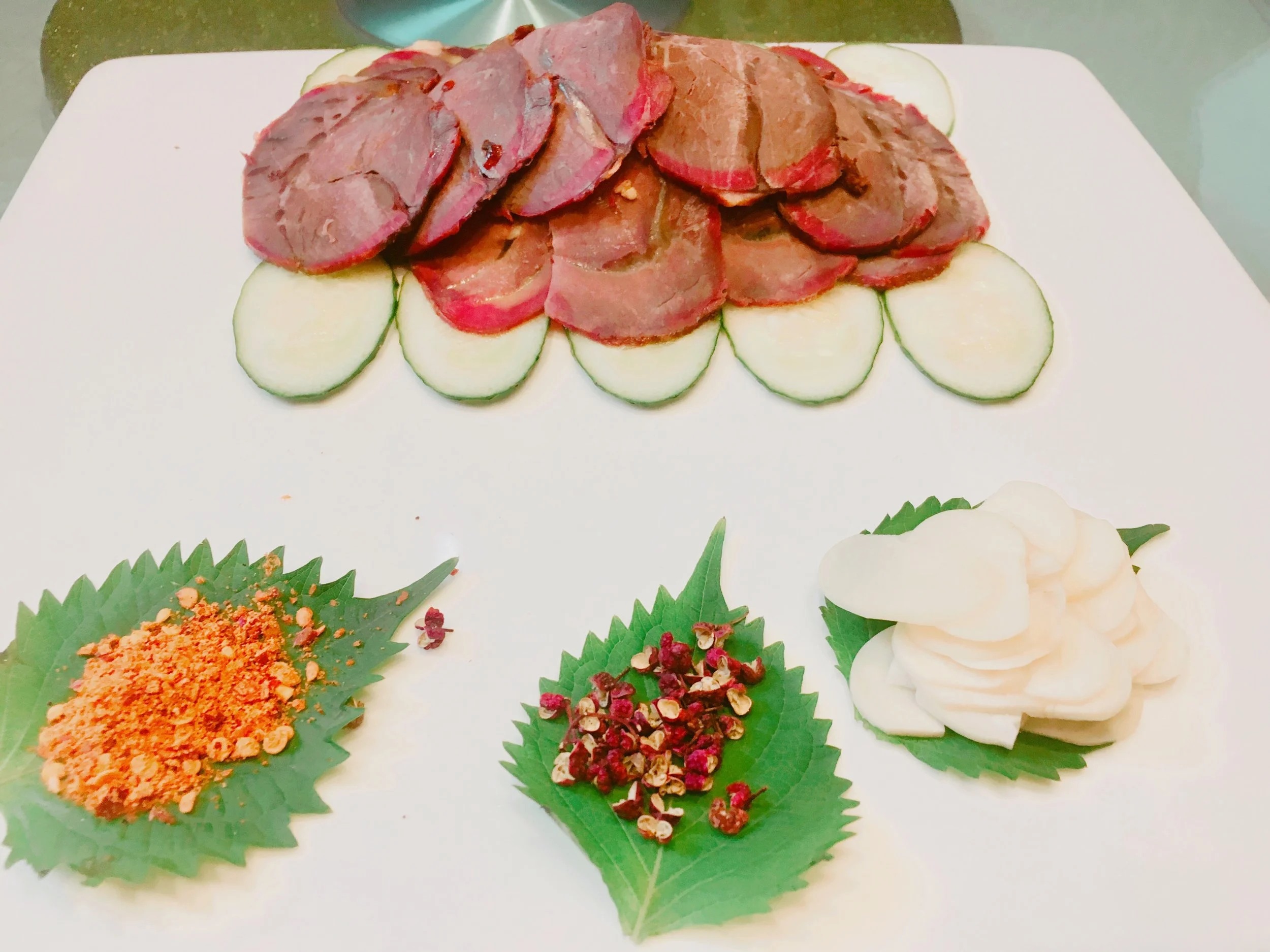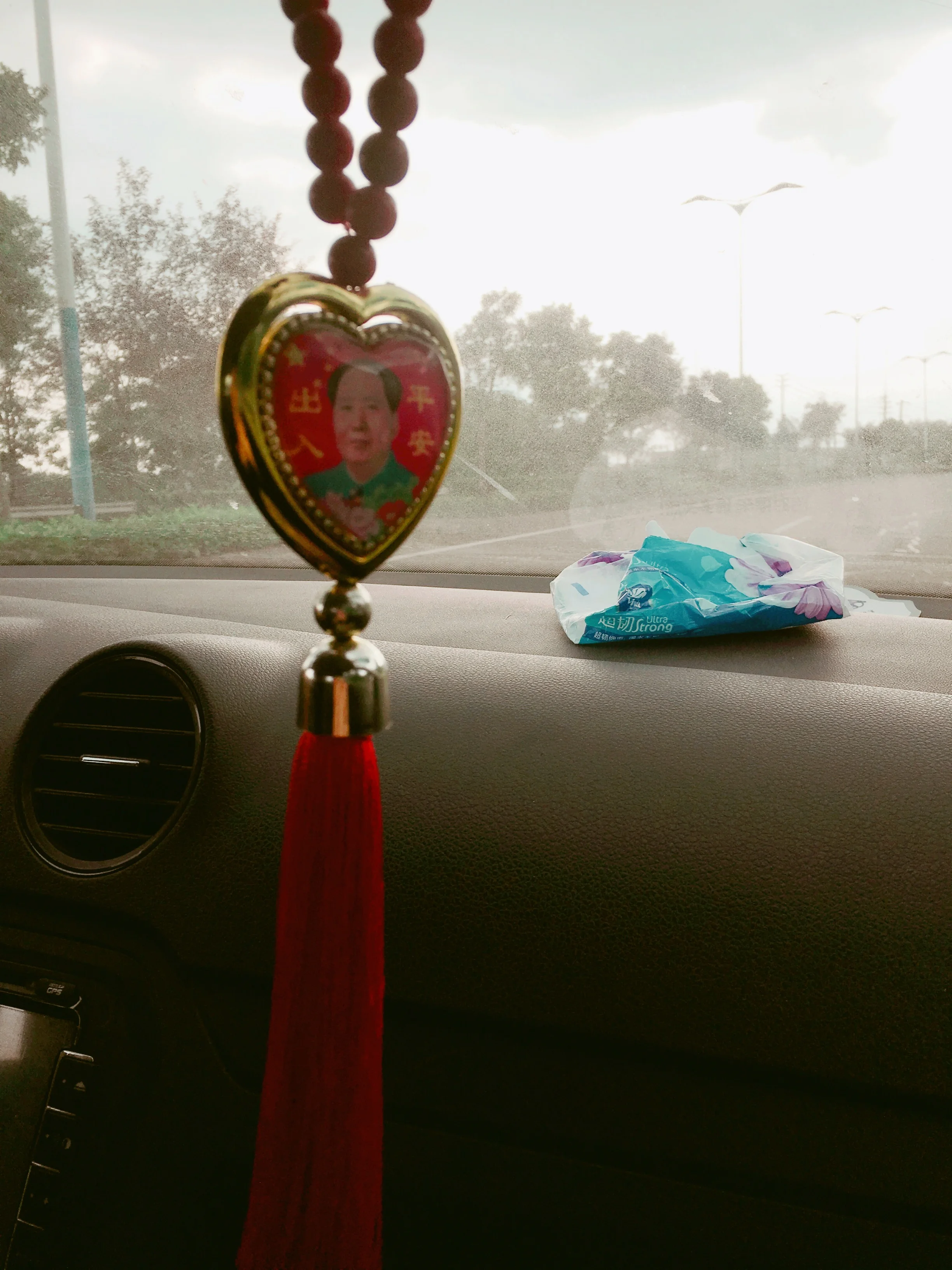The Relationship Doctor
Written by: Philana Woo
This is a guest post by my friend and writer Philana Woo. It is the first of a two part series on my foray into manufacturing in China to produce an all natural Sichuan chili sauce, which I am launching internationally on June 4.
Yesterday Jenny and I took a Didi an hour northeast of Chengdu city center to visit a hot sauce factory for her new business venture, Fly By Jing.
At the highway checkpoint, police asked to see our IDs. When they saw our foreign passports, they asked our driver where we were headed. He replied the Hotpot Cultural Institute, which I thought was clever. Later, I looked on Baidu maps and realized the factory was in fact known by that name.
Along the way, we passed a curious compound built in an architectural style I like to call ‘Gothic Revival lite’: a clear allusion to prestigious European institutions, imbued with historic significance, yet exempt from actually being dated. This style was a favorite among wealthy Chinese and set in a green grass gated compound, made for a credible school campus, albeit a massive one.
The sign read Sichuan Aviation Tourism College and we immediately imagined a Hogwarts for Chinese flight attendants. Later, Wikipedia would inform us the 2,700-acre facility is officially known as Civil Aviation Flight University of China, the world’s largest flight training institute, from which 90% civil aviation captains and 50% air traffic controllers graduated.
Sichuan Aviation Tourism College - a.k.a. Hogwarts for Chinese flight Attendants
“He replied the Hotpot Cultural Institute, which I thought was clever. Later, I looked on Baidu maps and realized the factory was in fact known by that name.”
As usual, our Chinese driver didn’t share our enthusiasm and was focused instead on navigating the by now winding mountain roads leading to the supposed factory. I say supposed because tucked deep inside the mountains is not what one imagines when one thinks of a hot sauce factory, even if it is the Hotpot Cultural Institute. Then again, I am not sure what to imagine, actually.
After a few missed turns and phone calls, we finally find it, an unassuming cluster of buildings guarded by a metal gate, at the end of an uphill driveway on the side of the mountain. We both wondered whether we were in the right place. We both also knew that this was, feasibly, not only a hot sauce factory, but one servicing over 1,000 domestic and international clients for this was, after all, China: land of the unassuming, home of the impossible.
Hot sauce billionaire, here we come.
Mr. Chen, the owner, comes out to greet us. He is an affable Chinese businessman in his late thirties or early forties (we learn later he is married with a 14-year-old daughter). Jenny found him through a series of leads and decided to look him up after discovering one of his longtime clients hails from her ancestral hometown. She figured this might give her some much-needed guanxi in an industry where her connections are tenuous at best. Jenny’s family is from the area, but they are academics and immigrated abroad long ago. They may be chili-eating people, but production was a whole other story.
“It was absurd, awkward, and what Chinese business lunches tend to be. ”
He saw his other guests out, two unsmiling men (hot sauce moguls perhaps?), and began talking shop with Jenny in Sichuan dialect, of which I understood about 95%. He took us for a tour of the factory, handing us stained caps with hairnets from the women’s locker room before we walked in. I asked if I should tuck my hair in, but it didn’t seem to matter.
We walked into the next room, which contained heavy machinery that can chop, mix, and cook ingredients for hot sauce. There were about three workers doing their thing. The factory is small, the smallest Jenny has seen. After the tour, which took about ten minutes including standing in the middle of the room for about five, we returned to his office to discuss logistics.
At noon an alarm sounded and one by one, half a dozen workers trickled in to punch their card. The atmosphere was relaxed, sleepy—like much of Chengdu, one of China’s largest cities renowned for its leisurely atmosphere. Chengdu was chill chili to bureaucratic Beijing and shiny Shanghai.
Chen offered to take us for lunch in town, a fifteen-minute drive back through the winding mountain roads. We would need a lift down to catch a cab to our next destination anyhow. Jenny acquiesces. We end up at a famous Sichuan chain restaurant, the type equipped for banquets. A 100-day baby celebration is taking place. We can hear the enthusiastic emcee over the mic as we pull into the parking lot. We walk past a Hello Kitty photo backdrop and into a room full of adults eating at tables as kids run around. The server leads us upstairs, where it is quieter. At first we are given a room with a table that seats 15. There were 15 of everything, including ashtrays. We dutifully sat down, trying to space ourselves apart evenly.
These private dining rooms or baojian, were designed to offer a sense of exclusivity and are therefore preferred for business meals. Despite spending many a lunch and dinner in baojians, I remain entertained by the inevitable discrepancy between pomp and circumstance. In our case, we were three near strangers who met in the countryside, wiping off sweat with pre-wetted courtesy hand towels, about to engage in some hot sauce talk over a fancy meal served on a gigantic lazy Susan while a baby birthday took place downstairs.
It was absurd, awkward, and what Chinese business lunches tend to be. All we were missing was moutai, the 80-proof grappa-like grain alcohol used to mark any occasion, and especially business deals.
Chen offered the menu to us but we defer to him, our only request being for vegetable dishes as they are harder to come by during client meals meant to impress, meaning meat dishes take precedent. After taking a few minutes to order from an iPad menu, we commenced conversation. I was just beginning to tune out when something piqued my interest.
I overheard Chen describe one of the many extra services he offers clients, some of whom own restaurants. Employee turnover is high in the food and beverage industry, and the same is true in China, where such work tends to be occupied by the unskilled and underpaid migrant worker population. So in addition to hot sauce manufacturing, Chen will sometimes step in as a job recruiter, especially during major holidays when workers tend to quit or visit home and never return.
Chen begins describing his winning strategy. Basically, he divides the staff into teams. Each team contributes a set amount, i.e. 200rmb. The employer matches the amount, doubling the pool. Teams then have a limited time to each procure a new hire. Successful teams receive a reward that is the sum of the pool divided by the number of teams. Teams that fail to find a new hire don’t receive anything and lose their original contribution. But there’s another catch—in order to redeem their reward, teams are responsible for ensuring their hire stays at least three months.
The bleeding heart liberal in me immediately questions the ethics of placing the burden of recruitment and retention on existing employees. What if a team can’t produce a new hire despite its best efforts? I understand incentivization, but object to the corresponding penalty. Chen insisted it was simply gamification to goad employees into action. He seemed oblivious to the ethics of such an arrangement. Despite being aware that restaurants in China are overwhelmingly independent, pseudo legal operations in which human resources and employee rights are not really a thing, I still could not hide my indignation.
Jenny offered that we were not objecting to the reward aspect of the “game”, but rather the penalty. Chen assured us again that without a penalty, which moreover is nominal, people wouldn’t pitch in, so it was simply a win-win strategy. In his eyes, he was helping them help themselves, so to speak. Besides, there is no limit on how many teams would collect the reward. Of course from the employer’s perspective, the strategy was genius: Create a self-sustaining recruitment and retention program funded by employees themselves. Realizing we would not see eye to eye and not wanting to offend, I decided the drop the subject.
Cold stewed beef with chili flakes and raw garlic
The dishes began arriving. First, a cold dish of sliced boiled, tendony beef served with local chili flakes and garlic slices. Next, sautéed yam leaves and a large claypot with vermicelli, mushrooms, peppers, and smoked pork.
Perhaps deciding we might take better to a story of romance and reconciliation versus employee exploitation, Chen began telling us about his forays in relationship counseling, also among his client services.
One of his clients, a married couple with three kids, suffered from chronic marriage problems. Despite still loving each other, they bickered constantly and neither side would concede wrongdoing. The romance was dead, with the husband having affairs and the wife complaining bitterly about feeling underappreciated. Daily life had gotten the best of them and was starting to take a toll on employee morale. When Chen heard about this, he went to his client and offered to fix the issue in seven days time and at the cost of 30,000rmb. Incredulous, the client offered 300,000rmb. So the groundwork for Chen’s project was laid. He arrived to the restaurant in secret, without the wife’s knowledge. Within five days, he had prepped and rehearsed with everyone. Everyone being the husband and entire staff—because, according to Chen, they all wanted their bosses to reconcile too.
We wondered jokingly whether his strategy was to apply a monetary reward (funded by employees’ salaries) in exchange for helping reconcile the couple. Laughing it off in his affable manner, he continued describing the events that unfolded the following afternoon. At 5pm they shut down the restaurant, which earned an average of 2,000rmb a night. What’s that compared to a marriage saved? A taxi was sent to bring the wife from their home to the restaurant, with the pretense being that she was needed to sign a document since she is the co-signer for the lease. The cab driver was paid 150rmb for a drive that normally cost 30rmb for the service of precise drop off. When the wife arrived at the restaurant, she stepped onto a red carpet leading to the restaurant door. The employees, alternately carrying flowers and candles, stood on either side of the carpet. She immediately turned to leave but the cab had already driven off, as instructed.
At this point, Chen tells us that earlier in the day, he had crafted a text message for the husband to send to the wife. The gist of the message was: Dearest wife, I am sorry for my behavior of late. He normally doesn’t address her with such tenderness. The husband was then instructed to put his phone away and ignore his wife’s subsequent messages. This was meant to soften her for what was to come.
Back to the red carpet, music starts to play—a Chinese love ballad Chen forgets the name of, but sings for effect nonetheless. Something about the road ahead, handholding and crying. The wife stands her ground, facial expression stern behind glasses. The husband appears at the door of the restaurant. What was he wearing? I interject with rapt attention. A suit? Jeans? Without skipping a beat, Chen replies “casual wear”. So then the husband begins towards her, at first slowly, then faster, and finally, sprinting and getting down on one knee. One of the staff hands him a large bouquet of flowers. He begins reciting a monologue Chen had prepared. The monologue, like most of the setup, reflects romantic clichés in the Asian pop tradition. He acknowledges his love for the long-suffering wife he is unworthy of. He apologizes for his wrongdoing and asks for forgiveness. The volume goes up—no one is spared—everyone, from the husband to the staff and some members of the 200-person crowd that has gathered cry. By now the wife’s stone-cold expression is rendered poignant by the downward flow of tears.
Spicy daikon and beef stew
The last dish arrives, a stew of daikon and beef.
We pick at it, more interested in the outcome of his story than the slightly tough beef. Upon completion of the monologue, the staff do as they have rehearsed and push the couple together so they hug. What? You pushed them together? Yes, these things require “assistance”, Chen replied, again, without skipping a beat. But the production is not over. Afterwards, Chen shows the couple two videos he had prepared, one showing the consequences of a couple who divorce, the other of a couple who reconcile. The latter features the couple growing old together, surrounded by prosperity and posterity. But where did you find these videos I ask? Well, I’m quite interested in human psychology and relationships, he offers by way of explanation. I can’t help but think of the 90s anti-drug commercial: This is your brain, this is your brain on drugs. This is your relationship, this is your relationship post divorce.
He concluded through his experience that people need chang (场), which translates to context. I thought to myself: chang, as in the right music; chang, as in the right lighting; chang, as in a red carpet; chang, as in flowers; chang, as in a repentant husband; chang, as in 200 people watching; chang, as in people to nudge you together on cue.
Apparently the couple is still going strong.
“The key, Chen emphasized, is large and many. He was referring to the gifts.”
Inside Chen's car
Just when we thought he could not impress us further, he told us about yet another instance when his relationship doctoring came in handy. He once orchestrated a surprise wedding. A university friend happened to own a fledging wedding planning company. As a PR stunt, he planned his friend’s proposal to his girlfriend in front of dozens of people in a public square. The entire event involved a wedding ceremony that followed immediately after. They brought the woman’s parents, schoolteachers from the countryside. He told them he wanted to make her feel like the most special woman in the world for one day. So the parents were present, along with other friends and family. She said yes (we assume), and they whisked her off to get her into a dress and made up within ten minutes. The wedding business is booming.
We wondered between ourselves (in English), when he had time to travel around for days, weeks at a time acting as a relationship doctor.
But before we could ask too many logistical questions, he started telling us about the time his sister employed his skills. His younger sister owns three mother and baby product shops around town. One year, rent on all three shops increased by 20 to 30 percent. Her attempts to negotiate down the increase failed, so she called her brother, the renowned relationship doctor, for help.
He agreed to the challenge, but only to one of the landlords, not all three. First, they figured out the family structure of the landlord. Parents, wife, kid—five people total. Next, they spent days scouring Taobao to buy gifts suited for each family member. Then, they visited the family bearing all the gifts. After unloading the bounty, Chen says he is grateful to the landlord for supporting his sister’s business. As a gesture of his appreciation, he comes bearing gifts. He begins presenting each gift. Here, you see, is a foot washing basin I bought for 1,200rmb while on a business trip in Hangzhou. (It was 80rmb on Taobao, he informs us, with great pleasure.) It has many medicinal benefits…
The key, Chen emphasized, is large and many. He was referring to the gifts. Apparently after this presenting of presents went on for a while, the landlord pulled him and his sister aside and bargained with them. He agreed to extend the lease for another three years without raising the rent.
Just when we thought he had revealed all his cards, he begins telling us about the uses of temple and praying for his clients. By this point, we are quite fatigued by his storytelling but try our best to keep up with him. During the holidays, he goes to temple and buys special offerings for his clients, writing their names and various blessings. He then takes a photo and sends it to them. You see, people usually go to temple to pray for themselves, but when you pray for a client, they are extra impressed, he said.
At this point, Jenny and I simultaneously agreed he should write a book about all the ways of dealing with people.
Of course, this was his way of advertising his client services. (He even offered to set Jenny up.)
As we are leaving the restaurant, he gets the car first. When he pulls up, he is wearing glasses. Jenny and I both do a double take as if to ask, is that him? It is, we get on, convinced he looked different. But in fact he had been wearing glasses all along. It was just that he was different in our eyes, perhaps, due to the stories he had told.
Chen dropped us off in a small town where Jenny was in search of some rabbit curers (cured rabbit is a specialty in these parts). Unlike Chen, they don’t really give us the time of day and Jenny concludes she should bring them gifts next time.
Chen would approve.











